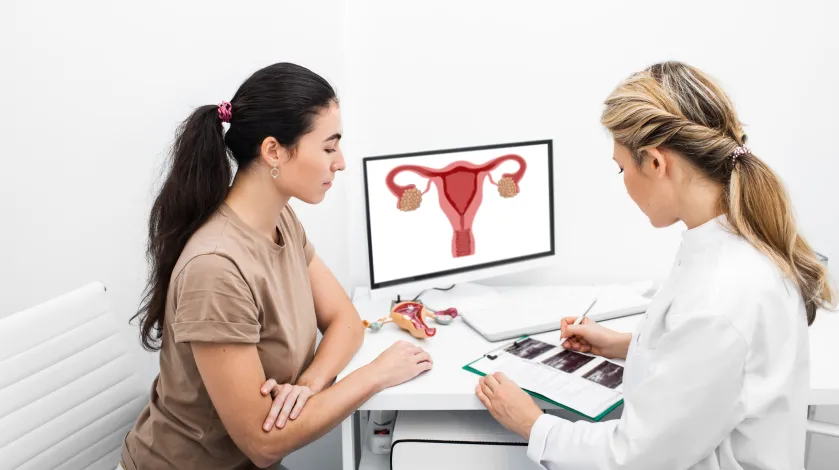Gynecologic Cancer Awareness: Screening and Early Detection Saves Lives
Author

Katelyn McGovern Dorney, MD
September is Gynecologic Cancer Awareness Month, a good time to shine a light on the disease and the importance of routine screening and early detection.
Gynecologic cancer is a term for all cancers of the female reproductive system, including the cervix, ovaries, uterus, vagina and vulva.
According to the American Cancer Society, more than 108,200 cases of gynecologic cancer will be diagnosed this year and about 32,000 women will die from the disease.
Katelyn McGovern Dorney, MD, a gynecologic oncologist at the Dana-Farber Brigham Cancer Center at South Shore Health answers questions about gynecologic cancer risk factors, symptoms and treatment and how regular exams and screening is helping to save lives.
When it comes to gynecologic cancer prevention, how important are routine or annual screenings?
Routine physical exams are very important, particularly a pelvic exam.
Routine screening can help detect abnormalities, precancers, or cancers at an earlier stage.
What kind of screening is available for gynecologic cancer and at what age should people start being screened?
Cervical cancer has a screening test – the Pap smear and HPV testing.
Patients should start screening for cervical cancer at age 21. The interval of testing depends on last test result, patient’s age, and HPV status.
There are also many diagnostic tests that can be done in the office that are used to rule out a gynecologic cancer when a symptom arises.
For example, an endometrial biopsy can be used when a patient has abnormal vaginal bleeding or postmenopausal bleeding to rule out an endometrial cancer or precancer.
Biopsies of the vulva, vagina, and cervix can also be done in the office.
What are some of the risk factors for gynecologic cancer and are there lifestyle or diet changes that can lower someone’s risk?
Obesity is a big risk factor for endometrial cancer. Extra fatty tissue makes hormones that stimulate the endometrium. Maintaining a healthy weight can help reduce the risk of the most common type of endometrial cancer.
Cervical, vulvar, and vaginal cancers are often HPV related. HPV vaccination prior to sexual activity and exposure to the virus can help reduce the risk of these cancers. Smoking increases the risk of a persistent HPV infection.
There are some family cancer syndromes such as BRCA and Lynch Syndrome that put patients at risk of certain gynecologic cancers. Knowing your family history (particularly family history of cancers) can be helpful. Prophylactic surgeries are sometimes recommended in these populations to decrease the risk of ovarian cancer or endometrial cancer.
What are some of the symptoms of gynecologic cancer that someone should be concerned about and discuss with their provider?
The hallmark symptom of endometrial cancer is postmenopausal vaginal bleeding.
Post-menopausal vaginal bleeding is not normal and requires a workup. Abnormal bleeding patterns in a premenopausal woman should also be examined to ensure no cervical or endometrial abnormality.
Pain or new growths on the vulva or vagina should be evaluated to rule out a cancer.
Ovarian cancer symptoms are sometimes vague and include bloating, change in bowel habits, early satiety, and abdominal pain.
What kind of treatment options are available for someone diagnosed with gynecologic cancer?
The treatment options for gynecologic cancer depends on which cancer is diagnosed: endometrial, uterine, cervical, vulvar, vaginal, or ovarian.
Treatment ultimately depends on the stage and the grade of a cancer. Some cancers can be treated with surgery alone and some will require chemotherapy and/or radiation therapy instead of surgery or along with surgery.
Katelyn McGovern Dorney, MD is a gynecologic oncologist at the Dana-Farber Brigham Cancer Center at South Shore Health. Learn more about Gynecologic Oncology Care at the Cancer Center.
Author

Katelyn McGovern Dorney, MD








